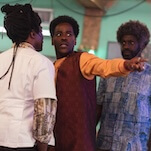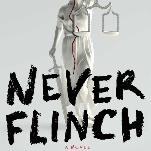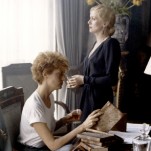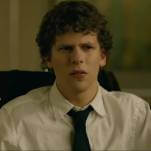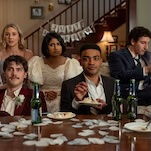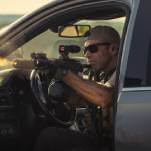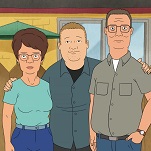Never say the MTV Movie Awards are entirely useless: For many, the left-field award given to Wes Anderson's 1996 debut feature Bottle Rocket was a first introduction to one of American film's most distinctive stylists, comic or otherwise. Written with longtime friend and collaborator Owen Wilson, Bottle Rocket established Anderson's knack for lacing whimsical comedy with a touch of melancholy, and launched Wilson's stardom. Anderson's reputation didn't take off until his 1998 follow-up Rushmore; from there, he made two ambitious ensemble pieces about family, the bittersweet New York tale The Royal Tenenbaums and The Life Aquatic With Steve Zissou, his eccentric first crack at a major studio production.
But along with my own interest in India, and my own affection for the country, the story that Jason, Roman, and I dreamed up together is about these three brothers who want to take a very programmed, spiritual journey of enlightenment, with laminated itineraries. And for somebody who would like to do that, and thinks that that might work, India might be at the top of their list of places to go and try it.
AVC: Did the film surprise you in how differently it turned out than what was planned?
WA: People seem to think that my movies are so carefully coordinated and arranged—and in a lot of ways, they are—but every single time I make a movie, I feel that every director makes these choices. You make choices about your script, you make choices about your actors, and how you're going to stage it, and how you're going to shoot it, and what the costumes are going to be like, and in every single detail, you make that decision. And for me, what ends up happening is, I wind up surprised at the combination of all these ingredients. It never is anything like what I expected. That was certainly the case with this movie. In the end, it doesn't resemble anything like what I had in my mind. And yet, piece by piece, they were all things we chose together along the way.
AVC: How well-schooled were you in Indian culture before embarking on this project? Had you spent much time there?
WA: I think I continue to be not well-schooled at all in Indian culture or history, because there is so much there. I've only been going there for a few years, and I started to go there because I wanted to work there. Satyajit Ray's films are part of what drew me to India, and I've seen and know a lot of his work. I know niches. But the movie's from the point of view of a Western tourist, and that's what I've always felt like there.
AVC: While this film has a luxuriant, exotic look that really isn't like Ray's work, you use a lot of wonderful music from his work. What kind of influence did he have on the film?
WA: For me, Ray was one of the ideal role models for the kind of director I would like to be. He's somebody who wrote his own scripts. He often adapted books, but he also created his own material. He was regional and had his own area in West Bengali, around Calcutta, where he worked. He had his own sources of money. He had a little family operation to make his movies, and he made a lot of movies. And they're often very personal.
Somewhere along the way, he started composing the scores for his movies, which I recently heard was for expediency, because he felt like he could turn them around a lot faster than what he was getting from the people he was working with. He didn't have enough money to wait for them to take longer. Anyway, I loved these movies. Somewhere along the line of writing this movie, I pulled one of Ray's scores I wanted to use at the beginning, and then realized there was a second one I wanted to use later on. We didn't really know how much we were going to use until we were in the cutting room. But the movie is wall to wall with music from Ray's films and from Merchant-Ivory's films up until [the three brothers] are kicked off the train.
[pagebreak]
AVC: You always collaborate on your scripts. Are there limits to what you feel you can accomplish on your own, or why do you feel the urge to collaborate?
WA: I think it's a few things. In the case of this film, one of my ideas was that I wanted to make a movie about India. Another of my ideas was that I wanted to make a movie about three brothers. And I thought I would like to do a movie on a train. But the biggest idea of any of those was that I thought I would like to write with Jason and Roman. The movie is really the combination of all three of our points of view, and I don't think it's anything like I would have done on my own. I enjoy working with collaborators, and I enjoy working with my friends. Part of the movie is about that process where one person is telling a story and it's connected to their own life. In this, Jason's character is able to move on to the next chapter in his life when he is able to finish the last chapter in his book.
AVC: The three of you traveled to India by train before writing the script. Was there role-playing involved? What sorts of things did you incorporate from that adventure?
WA: Mostly what we got out of that adventure were details. Those guys had never been to India at that point; they were just getting to know it. That was the main thing. We had the first part of the story figured out, but a lot of the movie is about traveling, and a lot of our experience as travelers went in it. I'm being vague because I can't think of anything specific.
AVC: Were there any stop-offs? In the film, the characters are stranded for a bit after they're booted from the train. Was there anything like that, where you were completely off what you intended to do?
WA: We planned a train journey, because we wanted to see what that was like. But we went there for two main reasons: So I could introduce those guys to India, and because we needed to write somewhere. So I thought this would be a good way to keep us together. Most of our time on that trip was spent writing, sitting in one room or another working on our story.
On that trip, we did things we normally might not have done, because we were trying to act out the story to some degree. So in situations where we might have been more reserved, because the story is filled with ritual and religion, we were always going into temples. I was particularly obsessed with participating in any religious ceremonies I could get involved with. We joined a lot of groups that I would normally be too shy to get involved with, but India is a place where often people make you feel very welcome. That colored that trip.
AVC: So many people talk about your movies being more resonant on repeat viewings. Is that by design? Are there emotional cues that are maybe subtler than people tend to pick up on the first viewing?
WA: I have a hunch that might be right. Any time someone doesn't like one on the first run, I hope they will give it another shot. At least we'll get another chance. But I do feel, in my approach, I am not really a minimalist. I don't like to leave out ideas that I think could add something to the story. Sometimes, you can't quite pick up on all of it in one sitting. It's not by design. But maybe it's a side effect of my approach.
In the case of this movie, we withhold a lot of information. There are lots of things that we have figured out about our characters that we don't tell the audience. We consistently made this decision not to explain things, because I felt it seemed right for the movie that it would be spare in terms of the information, until a certain point in the story. There are a couple of points where we reveal everything all at once without explaining it. That's sort of our idea.
AVC: There's always an economy and concision to your work. People talk about your films as having the qualities of a short story, in that respect.
WA: Well, there certainly are short stories where you suddenly get what was going on the whole time. And that's what happens with almost every play. You're really supposed to read the program before it starts, and then it takes some time to figure out what is going on. There's this Harold Pinter quote which I can paraphrase, which we kept referring to because we felt like it applied to what we wanted to do. He was asked to explain the meaning of one of his plays. And he said, "This is what they said, this is what they did, this is what happened." That's his whole thing. He doesn't really want to go beyond that. I wouldn't say that our movie takes this to the degree that Harold Pinter has, but we definitely felt some connection to that quote. Or that misquote, anyway.
AVC: Many recent movies owe a debt to your work. Are you flattered by that, or does it bother you.
WA: I think I would be flattered by that. If someone pointed it out, I would like to think that it's true.
AVC: It doesn't take anything away from what you're doing?
WA: No, the only thing that takes away from it is when they steal some music from one of my movies and put it in a TV commercial. I am not crazy about influencing TV commercials. But if I legitimately influence someone making a movie, I think that is really flattering.
AVC: Speaking of commercials, you've been doing some interesting ones lately. Under what circumstances do you take commercial work? Is it tough to advance a personal vision while still satisfying your client's need to sell something?
WA: Well, mostly with commercial work, it isn't about personal vision. It's not a personal effort, it's work for hire. That's more my attitude with those. You just want to be a professional worker. I did the American Express commercial, and that was different. They went to me and said, "It's a commercial, but you can write something." And I had something I wanted to do, and I could put my friends in it. Sometimes it's fun to do a commercial. But I consider it to have no connection to my personal work.
AVC: Maybe the commercials just seem personal, but the style is so unmistakably yours.
WA: It would be hard to argue that I wasn't still trying to do my thing. But if I was going to write something, they wouldn't have to keep saying things into their mobile phones.
AVC: Your last film, The Life Aquatic, was at a budget level you hadn't experienced before. You've downshifted a bit with Darjeeling Limited. Is there a level where you start to get uncomfortable? Do the expectations and distractions get too much when the budget reaches a certain level?
WA: With The Life Aquatic, for instance, that's a complicated movie with big sets and ships, and it's kind of a giant thing. We were making it shoestring for the kind of story we had to tell, but it was a giant, giant shoestring. We ended up spending $58 million on that movie. But there was no real effort made to modify it so that more people would go see it than any other movie that I've done. It's the same kind of personal story. I just did what I wanted to do. And maybe that isn't the right way to approach something where you're spending $58 million.
The other thing is, it took us 100 days to shoot that movie. It was very difficult. I like to work more quickly. With this movie, we made a particular effort to move quickly and find a system to move quickly and to make it for a much, much lower budget. We made it for a third of The Life Aquatic, and it was a happier film experience overall.























